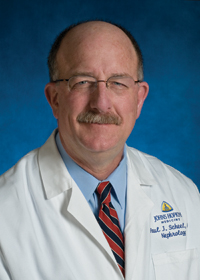March 5, 2012
Scheel named inaugural Ronald R. Peterson Professor in Nephrology
Paul J. Scheel Jr., an associate professor in the Johns Hopkins University School of Medicine, was named the inaugural Ronald R. Peterson Professor in Nephrology at the School of Medicine during a dedication ceremony on Thursday, March 1.
“Endowing a professorship provides the stability and flexibility needed for our faculty to improve the overall quality of a specific department,” said Edward D. Miller, the Frances Watt Baker, M.D., and Lenox D. Baker Jr., M.D., Dean of the Medical Faculty and CEO of Johns Hopkins Medicine. “The endowment will provide Dr. Scheel the resources necessary to take advantage of the important opportunities for innovation, research and treatment of patients.”
The endowed professorship is named in honor of Ronald R. Peterson, president of The Johns Hopkins Hospital and Health System and executive vice president of Johns Hopkins Medicine.
“Dr. Scheel is a superb clinician and innovative program builder, a devoted and accomplished teacher and an internationally recognized investigator in his field,” Peterson said. ”I am particularly honored for him to become the first recipient of this new professorship.”
Scheel is the director of the Division of Nephrology at The Johns Hopkins Hospital and Johns Hopkins Bayview Medical Center. After receiving his medical degree from Georgetown University, he completed a residency in internal medicine and a fellowship in nephrology at Johns Hopkins. He joined the faculty in 1992 and became director of the division in 2004.
Renowned for his expertise in the care of patients with renal disease, Scheel is responsible for developing medical therapy to treat patients with a rare disorder, retroperitoneal fibrosis. The therapy, developed by Scheel, is used by physicians throughout the world and eliminates the need for surgery or chronic indwelling ureteral stents.
“I am truly grateful for this endowment as it will enable our division to continue our fight to understand how autoimmune disorders work,” Scheel said. “Only by understanding the mechanisms of immunologic and autoimmune disorders can we determine the best approach for treatment, management and, ultimately, prevention of kidney diseases.”


